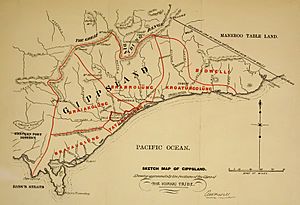Gunaikurnai language facts for kids
Quick facts for kids Gunaikurnai |
|
|---|---|
| Gaanay Kannai |
|
| Region | Gippsland, Victoria, Australia |
| Ethnicity | Gunaikurnai (Brabiralung, Braiakaulung, Bratauolung, Krauatungalung, Tatungalung), Bidawal |
| Native speakers | 4 (2016 census) |
| Language family |
Pama–Nyungan
|
| Dialects |
Muk-thang
Nulit
Thangquai
|
| AIATSIS | S68 Gunnai (cover term), S49 |

Sketch map of Gippsland - showing approximately the positions of the clans of the Kurnai tribe.
|
|
The Gunaikurnai or Gunai/Kurnai language is an Australian Aboriginal language. It was spoken by the Gunaikurnai people in Gippsland, which is in south-east Victoria.
Sometimes, people also spell it as Gunnai, Kurnai, Ganai, Gaanay, or Kurnay. Another language called Bidawal was either a very different way of speaking Gunaikurnai or a language that was closely related to it.
Contents
Different Ways of Speaking Gunaikurnai
The word Gunai means 'man'. The Gunaikurnai language didn't have one big name for itself. Instead, each of its different ways of speaking, called dialects, had its own name.
In 1996, a report for the Victorian Aboriginal Corporation for Languages listed five main Gunaikurnai dialects: Brabralung, Braiakalung, Brataualung, Krauatungalung and Tatungalung.
- Brabralung: This name means 'belonging to man'. These people lived in central Gippsland.
- Braiakalung: This means 'man belonging to the west'. They lived around Sale and towards the mountains.
- Brataualung: This name means 'men belonging to this place which have fire'. They lived in South Gippsland.
- Krauatungalung: This means 'belonging to the east'. These people lived eastwards, all the way to the Snowy River.
- Tatungalung: This means 'belonging to the sea'. They lived along the coast between Lake King and Lake Wellington.
Sometimes, the Gunaikurnai dialects have been mixed up with Muk-thang or Bidawal. It seems there are two separate languages, but it's not always clear which way of speaking belongs to which language.
Bringing the Language Back
Since the early 1990s, an organization called the Victorian Aboriginal Corporation for Languages (VACL) has been working hard. They started the Yirruk-Tinnor Gunnai/Kŭrnai language program. This program focuses on bringing the Gunnai language of Gippsland back to life.
Doris Paton is the coordinator of this program. Lynnette Solomon-Dent is a language worker and consultant who helps with the program. They have created many learning materials to help people learn more about the Gunnai language and culture.
Lynnette Solomon-Dent also helped write important teaching documents for schools. These documents are used to teach children from kindergarten to year 10, and even students in higher education. This work helps community members keep teaching the language to future generations.
Place Names from Gunaikurnai Language
Many places in the Gunaikurnai country have names that come from their language. Some of these names end with -munjie, which means "place".
| Place Name | Meaning or Origin |
|---|---|
| Boolarra | People think this means "plenty". |
| Briagolong | This name comes from the Braiakulung clan. |
| Buchan | From Bukkan-munjie, meaning "place of the bag". |
| Croajingolong National Park | This name comes from the Krauatungulung clan. |
| Moe | From the word Mouay, meaning "swamp". This is because there was a big swamp there before it was drained. |
| Moondarra | This word means "thunder". |
| Morwell | Some say this comes from Gunaikurnai words meaning "woolly possum". But others disagree, as the Gunaikurnai word for possum was wadthan. |
| Traralgon | The origin is not certain. Some believe it means "river" (tarra) and "little fish" (algon). However, modern language experts say the word for river in Gunaikurnai is wun wun or wurn wurn. |
| Wy Yung | Some sources say this means "spoonbill", while others say it's a type of duck. |
| Yallourn | This might come from a term meaning "brown fire". |
| Yarram | This could come from Yarraam Yarraam, meaning "plenty of water". |
| Yinnar | People think this comes from the word for "woman". |
See also
 In Spanish: Idioma gunai para niños
In Spanish: Idioma gunai para niños
 | Claudette Colvin |
 | Myrlie Evers-Williams |
 | Alberta Odell Jones |

